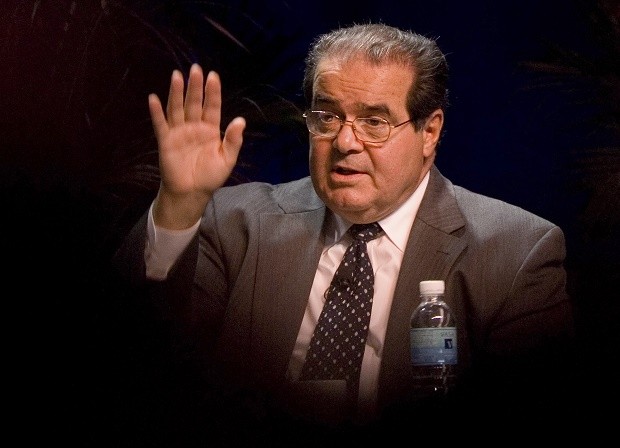Obama, Republicans battle over US Supreme Court vacancy

In this Oct., 15, 2006 file photo, Supreme Court Associate Justice Antonin Scalia speaks at the ACLU Membership Conference in Washington. On Saturday, Feb. 13, 2016, the U.S. Marshals Service confirmed that Scalia has died at the age of 79. AP
WASHINGTON, United States — The sudden death of Justice Antonin Scalia, a towering conservative icon on the US Supreme Court, has set off an epic election-year battle over his successor that will shape American life far into the future.
Scalia died of an apparent heart attack at age 79, leaving what has been a conservative-dominated court evenly divided in a year of blockbuster cases — on abortion, affirmative action, immigration and President Barack Obama’s health care law.
READ: US SC Justice Antonin Scalia dead at 79 | Landmark rulings see US Supreme Court move to the left
The news sent shockwaves through the race for the White House, as Republican and Democratic candidates absorbed the implications of the surprise, potentially course-altering opening on the court.
“I think last night with the passing of Justice Scalia, we are reminded of how important this election is, how high the stakes are and why we must win,” Senator Marco Rubio, in a bitter fight for the Republican nomination, told “Fox News Sunday.”
Article continues after this advertisementFiring the first shot in the succession battle, Obama said he would exercise his “constitutional responsibilities” and name a successor.
Article continues after this advertisementLeading Republicans — including all six conservative White House contenders — threatened to block any nomination Obama puts forth, arguing that it should be left to the next president to fill Scalia’s vacant seat.
Republicans contended that no president in 80 years has nominated a Supreme Court Justice in his final year in office.
But Justice Anthony Kennedy, nominated by Ronald Reagan, was confirmed in 1988, an election year.
Obama called on the Senate to give his nominee a “fair hearing and a timely vote.”
The president nominates Supreme Court candidates, but Senate approval is required for them to take up the lifetime post, which has led to some viciously fought nomination battles.
‘Rare talent’
Obama ordered flags to fly at half-staff across the United States to mark Scalia’s passing, praising him as “one of the towering legal figures of our time.”
Scalia died at a private ranch in the Big Bend area of West Texas during a hunting trip. Presidio County Judge Cinderela Guevara told WFAA television the cause of death was a heart attack.
Appointed to the Supreme Court by Reagan in 1986, Scalia championed originalism, the legal theory that the meaning of the Constitution should be interpreted as fixed at the time it was ratified, in 1788.
According to this view, there is no doubt as to the validity of the death penalty and the right to bear arms.
A devout Catholic who had nine children, Scalia derided abortion and same-sex marriage as new rights that would have been unfathomable to the writers of the Constitution.
Brilliant, witty and scathing in his opinions, he was known as much for his slashing dissents as his majority opinions.
Scalia “was a bad boy on the bench who certainly never wrote a bad sentence,” biographer Joan Biskupic told CNN.
To the surprise of some, the portly, affable Scalia was able to separate his legal opinions from his personal relations, celebrating New Year’s each year with liberal Justice Ruth Bader Ginsberg and taking the newest justice Elena Kagan skeet shooting.
“He was a jurist of captivating brilliance and wit, with a rare talent to make even the most sober judge laugh,” Ginsberg said in remembering her “treasured friend.”
Court’s future in play
His death’s impact on the court will be immediate, even though the succession struggle will take time to play out.
With a 5-4 conservative majority, the court had recently stalled key efforts by Obama’s administration on climate change and immigration.
Now, with the court split evenly 4-4, lower court rulings will be upheld in cases that end with a tied decision, thereby blunting the conservatives’ hold.
This term is stacked high with hot button issues, including the first abortion case since 2007 — a review of restrictions imposed by the state of Texas on abortion clinics.
The court also will decide whether Obama has the authority as president to protect millions of illegal immigrants from deportation.
And it will take up a challenge by religious groups to his signature Affordable Care Act.
Another case involves whether race and ethnicity can be used in deciding college admissions.
‘Delay, delay, delay’
Republican leaders immediately took up the cry against an Obama nomination to the court, setting the stage for a bruising election year fight.
“The American people should have a voice in the selection of their next Supreme Court Justice,” said Senate Republican Majority Leader Mitch McConnell.
“Therefore, this vacancy should not be filled until we have a new president.”
McConnell’s Democratic counterpart Harry Reid pressed for Obama to send a nominee to the Senate “right away,” stressing that a yearlong vacancy — raising the prospect of 4 to 4 splits on major issues — would be “unprecedented.”
“Failing to fill this vacancy would be a shameful abdication of one of the Senate’s most essential Constitutional responsibilities,” Reid said.
Democratic White House hopeful Hillary Clinton said Republicans calling for a delay “dishonor our Constitution.”
Her Democratic rival Bernie Sanders insisted a “full contingent” was needed on the Supreme Court.
On the debate stage in South Carolina Saturday night, all six Republican presidential contenders bowed their heads in silence to honor the late justice — and united to oppose Obama nominating his successor.
Republican frontrunner Donald Trump said it was up to Senate Republicans to “delay, delay, delay” any nomination sought by Obama.